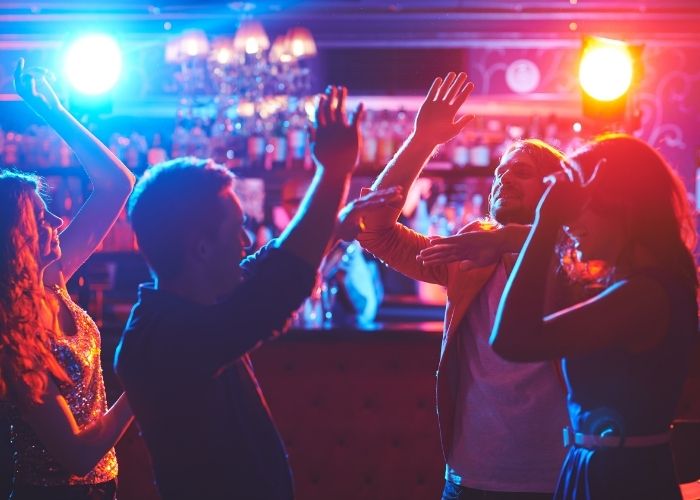MADRID – Residents drove out of city centres by exorbitant rents, or suffering from constant (noise) nuisance, lack of facilities as the population grows exponentially, and nuisance from partying holidaymakers and drunken tourists…
That’s what several neighbourhoods in Barcelona and Palma de Mallorca have been suffering from for years. However, these are not the only cities that are increasingly groaning under the pressure of the high tourist numbers. After two years of relative calm, the subject is topical again for many cities with the return of those tourists.
Of course, people are happy to be able to open their businesses again and earn money. However, in the current way, it is no longer tenable according to many. For example, residents of Málaga have been complaining that the historic centre no longer belongs to them. Moreover, it has been taken over by tourists. The countless terraces in the city cause noise nuisance to residents and entrepreneurs who have been running successful businesses for decades. Consequently, they are now closing their shutters one by one because they can no longer afford the sharply increased rent.
A recent example is the famous Café Central, a traditional café and restaurant with a terrace in an iconic spot in the heart of the city. However, the rent that is now being asked for the space is €35,000 per month.
Madrid
Also in Madrid, several neighbourhood associations denounce the serious overcrowding and associated noise pollution in different parts of the city. This is also due to the nightlife and drunken tourism.
Garbage accumulation, excessive noise, and street brawls are the main challenges facing the capital. This is a daily occurrence for residents and drivers of cities such as Barcelona and Palma from May to September.
According to Madridiario, platforms such as SOS Malasaña or the neighbourhood association Organillo de Chamberí condemn non-compliance with the regulations by entertainment venues, which are located directly on the street. This gives rise to “makeshift terraces” and the “uncontrollable” sprawl of hotels, hostels, and rental apartments, leading to “excessive overcrowding”.
‘Brutal revelry’
“The centre is more than saturated. There is no physical space. We are forced to live with a brutal revelry. Some bars already sell on the street, so that people who can’t find a place inside continue to eat, drink and chat under our windows day and night.
Harmful to the quality of life of residents
In addition, our neighbourhoods are overrun with hotels and rental apartments. We say yes to tourism! However, not in this way because it harms the quality of life of residents,” said a spokesperson for SOS Malasaña. This platform has been denouncing noise nuisance from tourism in the tourist and entertainment district for years. It is also fighting for the sustainability and health of the area.
Noise disturbance
Up to 44% of Madrid’s residents are exposed to loud noises daily”. Mostly it comes from traffic, but overcrowding and tourism contribute significantly to the noise problem.
SOS Malasaña argues that the current hotel and tourist model is killing the centre, the soul of the city. “If all leisure activities are concentrated in two or three small parts of the city, such as our neighbourhood, downtown, or La Latina, it will be hell. Especially in the historic part.”
Vomit in 11 places
All this brings other related issues. Residents are forced to live with filth and insecurity. “This morning I was walking down Calle de la Palma and I counted up to 11 spots of vomit. Every day when it gets light, areas like the Plaza del Dos de Mayo are full of garbage, cans, bottles, and plastic bags to keep the drinks in… Not to mention the constant fighting. The involution of recent years is terrible. All these factors together harm the inhabitants”, says José Luis, one of them who lives in Malasaña, about the nuisance he experiences every day.
Solution is simple
According to the platform, the solution is “simple”, entrepreneurs only have to comply with the applicable regulations and the municipality has to enforce them. BUT, according to residents, the latter is looking “the other way”. “Many hoteliers are only interested in making money and this, added to the laziness and unwillingness of the city council, offers room for all kinds of abuses.”
Chamberí neighbourhood
The Chamberí district and in particular Ponzano Street is also burdened by the nuisance. The number of terraces with additional noise nuisance for residents has expanded enormously in recent years. The neighbourhood association wants to put an end to this predatory model, in which investment groups profit from continued non-compliance with regulations. And this eventually leads to a huge ‘botellón’,” a spokesman for El Organillo de Chamberí argues to Madridiario.
Acoustic protection zone
To counteract noise nuisance in the district, the municipality has started to establish an acoustic protection zone (ZPAE) in the area. To this end, measurements were taken at 22 different locations between September 2021 and February 2022. The results of the analysis conclude that leisure is the main source of noise, especially on weekends and at night, followed by traffic.
Residents consider this a “very positive measure” that must be accompanied using enforcement, as not all operators will respect rules such as early closing times from the start.
Also read: Zero tolerance for drunken tourists on Balearic Islands


